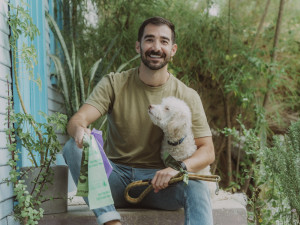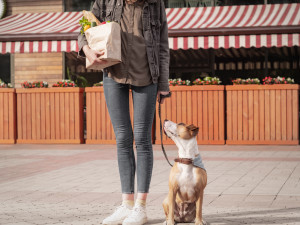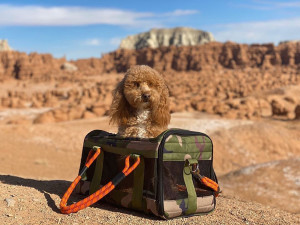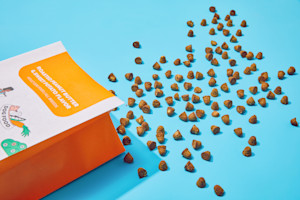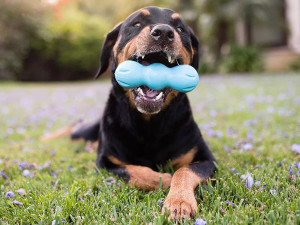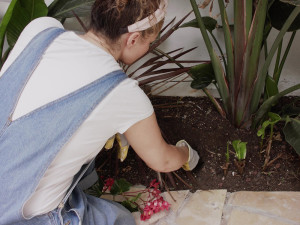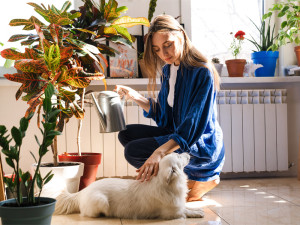Your Comprehensive Guide to Eco-Labels on Pet Products
Here are the sustainability buzzwords you should look out for on the packages of your fave products.
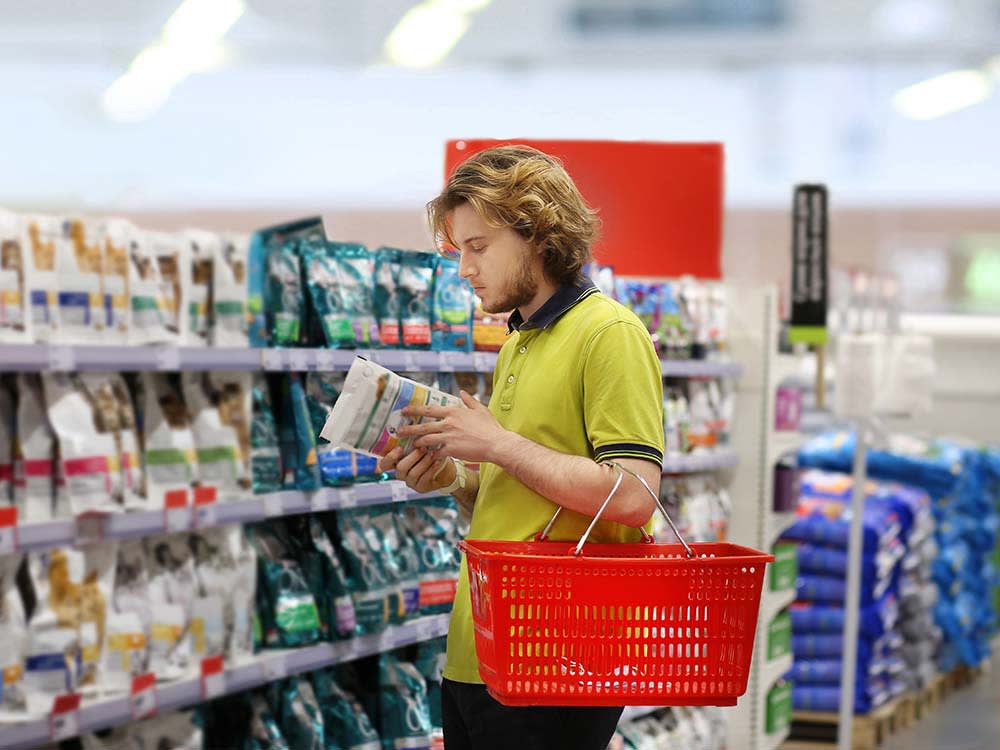
Share Article
The mission of my trip to the pet store isn’t to buy a new treat or chew toy. Instead, my aim is to jot down all of the eco-labels and certifications I can spot within a short timespan. (I give it about seven minutes before the shop owner starts to think I’m crazy.) My fingers can’t type them all fast enough. Some products have up to four, five, or six claims on the front of their packaging, forming a mosaic of falling leaves, happy animals, and soft green fonts.
My frantic foray through the pet store tracks with what Melissa Bauer of the Pet Sustainability Coalitionopens in new tab, a nonprofit organization helping pet companies and suppliers move towards more sustainable production practices, is seeing across the industry. As consumers demand more environmentally friendly products, brands are investing in more labels to convey their commitment to reducing their impact.
And that’s great — as long as the labels they use are legitimate. “You don’t want a certification that’s just a pay-to-play model. You want something that has a third-party verification assessment and process,” Bauer tells me on a Zoom call. But with so many labels out there, it can be tough to know what they all mean and which ones to trust.
That’s why we put together this quick but comprehensive guide to help eco-minded pet parents distinguish the legit from the lacking.

B Corp
Over the past few years, Bauer has seen brands look beyond just their ingredients and packaging to consider the carbon footprint of their entire business. This means that labels like B Corpopens in new tab — a rigorous certification that rates companies on environmental and social responsibility on a scale of 200 — are becoming more common. “That’s kind of the best of the best, both within the pet industry and beyond,” Bauer says of the B Corp stamp. “It’s also a really big challenge [to obtain].”
Biodegradable packaging
This claim doesn’t mean much. Most materials will technically “biodegrade” over time, getting smaller and smaller when exposed to natural elements. (Case in point: petroleum-based plastics that become microplastics in the ocean.) “When it comes to anything labeled ‘biodegradable,’ I always consider it a ‘buyer beware’ situation,” Bauer says.
Biodegradable Products Institute (BPI)
You’ll find the BPI Compostable labelopens in new tab on product packaging that will quickly and completely break down in an industrial compost facility (usually within about 90 days). Packaging with this verification will break down in super-hot conditions, but it doesn’t necessarily belong in your backyard compost pile.
Certified Humane
Seeing the Certified Humane labelopens in new tab on an animal product shows that the animal was treated according to a set of welfare standards created with scientific research, vet advice, and farmer experience in mind. The standard is audited by third-party animal scientists.
Forest Stewardship Council (FSC)
The FSC is the leading certifieropens in new tab of wood products that don’t contribute to deforestation or human rights abuses. Look out for their little tree stamp on wooden cat or dog houses, feeders, etc.
Green
This claim is not backed by a third-party certification, and it doesn’t tell you anything about how a product was made.
How2Recycle
This labeling systemopens in new tab shows you if a product’s packaging can be recycled in a curbside program. Keep in mind that recycling protocols differ depending on where you live, so you should always check your local rules if you’re unsure what bin something goes in. If reducing packaging waste is something that’s important to you, look for a pet brand that recycles through TerraCycle.
Made in the USA
Bauer notes that this label regulated by the FTCopens in new tab is one a lot of consumers are looking for. While it shows that a product helped create jobs within the U.S., the “Made in the USA” label doesn’t say much else about its environmental and social impact.
Marine Stewardship Council (MSC)
The MSC is an independent certification program opens in new tab that verifies and audits sustainable fisheries. Fish products with this label were responsibly wild-caught from a population that is not at risk of being overfished.
Natural
The term “natural” is regulated by the FDAopens in new tab on food products, including pet foods. For a kibble or treat to be labeled natural, it means that “nothing artificial or synthetic (including all color additives regardless of source) has been included in, or has been added to, a food that would not normally be expected to be in that food.”
Ocean wise
This stampopens in new tab is not a certification, but rather a recommendation from the Ocean Wise Seafood program that shows a type of seafood is “ocean-friendly” and is not suspected to be at risk of overfishing.
Toxin-free
Bad news for those who want to make sure their pet isn’t chomping down on anything that could harm health: This is another claim that doesn’t mean much unless it’s backed by a third-party certification label such as Made Safeopens in new tab or EWG Verifiedopens in new tab — both of which are relatively rare in the pet space.
Raised without hormones
Because FDA Law prohibits the use of added hormones in pork and poultry products, seeing this claim on pet foods from these animals doesn’t mean much. It’s more important for beef products.
Regenerative Organic Certified (ROC)
This new labelopens in new tab shows that your pet’s food, clothing, or personal care products were grown in a way that protects soil health, animal welfare, and farmworker fairness. In order to get ROC certified, farms must already be USDA Certified Organic too. (More on that below.)
Roundtable on Sustainable Palm Oil (RSPO)
This is an important labelopens in new tab to look for on pet food that has palm oil listed as one of the first few ingredients. Many farmers around the world illegally chop down valuable old-growth forests to make way for the cash crop, but the RSPO designates sustainable palm oil that doesn’t contribute to deforestation.
UPcycled
This new certificationopens in new tab from the Upcycled Certified Program demonstrates that a product contains upcycled food ingredients, and therefore helps divert waste from landfill. (For example: a dog treat made from sweet potatoes that would have otherwise gone to waste.)
USDA Certified Organic
The USDA labelopens in new tab shows that an agricultural product has been grown without the use of synthetic fertilizers and pesticides.
1% for the Planet
Brands that have taken the 1% for the Planetopens in new tab pledge contribute at least one percent of their annual sales to environmental causes.
This list will at least give you a good sense of the types of labels you’ll spot in your local pet shop or online. And if there’s a label here that you care about but are not seeing on your favorite brand, Bauer encourages you to ask the company about it. “Pet companies care what their consumers think,” she reiterates. “Consumers’ voices are really important for pushing the industry in a more sustainable direction.”

Emma Loewe
Emma is a writer, editor, and environmentalist based in New York City. She is the senior sustainability editor at MindBodyGreen, the author of Return To Nature: The New Science of How Natural Landscapes Restore Us (April 2022), and the co-author of The Spirit Almanac: A Modern Guide To Ancient Self-Care. Her writing has appeared in Grist, National Geographic, Civil Eats, and Outside Magazine, among others. While she doesn’t have any pets of her own, she is a loving dog aunt to Pip the pup.
Related articles
![petaluma sustainable pet food the wildest mars]()
The Sustainable Pet Food Movement is Fired Up
From cricket kibble to miso mice, leading brands are exploring how sustainable pet food products can reduce carbon paw prints.
![]()
Petaluma Is Getting Dogs to Eat Their Veggies
The brand’s plant-based, protein-packed dog food and treats are sure to satisfy your pup’s appetite and your sustainability concerns.
![project hive pet company dog toys]()
The Bee-Inspired Toys Dogs Are Buzzing About
“Saving bees brings more beauty and joy into the world — just like dogs do.��”
![Doberman dog chewing West Paw blue chew toy happily]()
West Paw Is Leading the Pack in Pet Sustainability
Founder Spencer Williams shares his top tips for pet parents looking to lighten their impact.
![A woman digging a big hole in her flower bed]()
How to Compost Your Pet’s Poop
Without getting totally grossed out.
![eco-friendly pet parent pets down inside of indoor garden]()
How to Be an Eco-Friendly Pet Parent
Reducing your paw print can seem daunting. Consider these simple tips.
